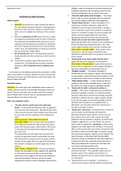Summary
Summary Introduction to Trusts Sumamry notes- Equity and Trusts
- Course
- Institution
- Book
These are notes on an introduction to trusts law created in 2019. They follow a structured format which condenses the relevant case law, statutory provisions and academic opinion that are relevant to the topic to aid with exam revision.
[Show more]




